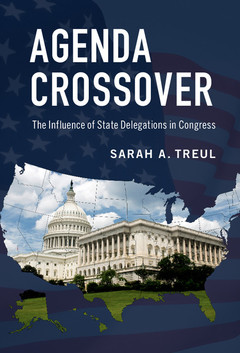Description
Agenda Crossover
The Influence of State Delegations in Congress
Author: Treul Sarah A.
An analysis of how members of Congress utilize their state delegations across legislative chambers to remain responsive to constituents and assist in re-election efforts.
Language: English
Subject for Agenda Crossover:
Approximative price 107.80 €
In Print (Delivery period: 14 days).
Add to cart
Publication date: 04-2017
Support: Print on demand
Support: Print on demand
Description
/li>Contents
/li>Biography
/li>
Agenda Crossover updates our understanding of state delegations, exploring how they influence representation and responsiveness in Congress today. The theory of agenda crossover posits that members of the House and Senate have much to gain from monitoring the legislative agendas of other members of the delegation, especially those in the opposite chamber. Treul clearly demonstrates that individual members of delegations still utilize their fellow delegates in order to help them respond to constituents and enhance their own electoral success. It is argued that on certain issues - particularly the ones most relevant to a state's economy - members of Congress are willing to set aside partisan differences and work across the aisle. In this way, these bicameral connections between members of a state delegation - even across party lines - can, at times, trump the power of party in Congress.
1. State delegations in Congress; 2. A history of state delegations; 3. State delegations and legislative behavior in the House; 4. State delegations and legislative behavior in the Senate; 5. Agenda crossover in the US Congress; 6. Rethinking state delegations in Congress; Appendix A. Interviews; Appendix B. Wisconsin's unwritten rule.
Sarah A. Treul is an Assistant Professor of Political Science at the University of North Carolina, Chapel Hill, specializing in American political institutions, with an emphasis on the US Congress. She is the recipient of the Tanner Award for Excellence in Undergraduate Teaching at the University of North Carolina, Chapel Hill.
© 2024 LAVOISIER S.A.S.




